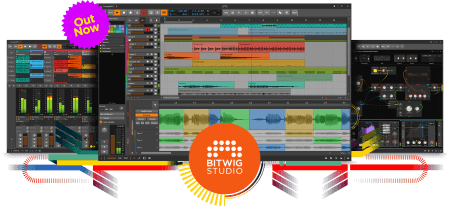
This means comping for audio clips, both in the Clip Launcher and the Arranger. A new set of Operators, for changing the chance, recurrence, and more of any note or audio event. Random Spread for any expression point (like per-note pitch, or audio panning) with perfect control. And Native Apple Silicon support on Mac, even allowing Intel and ARM plug-ins to work side-by-side.
Welcome to Bitwig Studio 4.
Audio Comping, Anywhere the Clip Goes
Since the invention of studio recording, our task has been to create the perfect performance. Comping allows you to combine the best parts of many takes, and Bitwig Studio provides this and more.
Each take is given its own color so from the first swipe of a take lane, the sources are clear. To swap in a different take, just tap it. Then press the up or down arrow to cycle thru the other takes. From the composite lane, move a boundary by clicking, adjust gain by dragging, or fix timing by sliding.
Since we have a Launcher and an Arranger, comping lives inside the audio clip. So if you are composing in the Launcher, just click to enable comp recording right there. Or just drag clips in either direction with your takes safely inside. Even open the layered editor when multiple comps belong together. Comping works wherever you are, now and later.
And since all good techniques deserve a new trick, right-click any audio clip to Fold To Takes. If you ask for an eight-bar comp, the entire clip will be spooled into take lanes, and the comping can begin. Or just drag audio in to add a new take lane. The stranger the sources, the newer the result.
Comping In Action With Tauri
Learn how experimental pop duo Tauri used the comping workflow in Bitwig Studio 4 when producing their song "In The Dark." The song is out on all major music platforms, and it's also available in Bitwig Studio 4 as a full Bitwig demo project for you to explore and remix.
Meet Tauri and get a behind-the-scenes view of their comping workflow in this in-depth artist story.
Operators: Maybe the Best Loops Don't
Modulation has always been a centerpiece of Bitwig Studio. Modulators have been there all along, putting device parameters into motion. And now with Operators, sequenced note and audio events can become electric too. This leads to clips that go to different possibilities and timelines, either by programming, by performance control, or by destiny.
Anti-Loops
Bitwig Studio 4 sees the arrival of comping for audio clips and Operators for all sequenced events. The brand-new sound package Anti-Loops uses these features to push the idea of what a loop is to the breaking point, with 100+ clips crafted by expert sound designers like Cristian Vogel, Pat Cupo, Polarity and others.
What's new in 4.3
Your Sound is Going Spaces
Our new device, Convolution, can take any sound anywhere — even places that don't exist. All convolutions imprint your sound with an “impulse,” and ours comes ready-made with 270 of them, ranging from 12th-century cathedrals and legendary studio effects to more abstract “environments.” Using the impulse of a room or hall creates a realistic reverb, but Bitwig's Convolution and content offers so much more.
Fashionably Late
Delay+ is Bitwig's latest boutique audio effect. By balancing familiar controls along with a few thoughtful new ones, Delay+ can either add a little character or fully transform your sound as it ping-pongs along.
The New Face of Polymer
Polymer and The Grid use the same modules, so when something new comes along, everybody wins. For Bitwig 4.3, some analog-inspired goodies have arrived.
Two modules are new. Union is an oscillator that plays it straight, blending three waveshapes into one pleasant, drifting output. And for filtering, Low-pass MG honors Mister Moog by imitating both his classic filter and mix buss.
Topping Off
As always, a few more new features came along for the ride. For example, FX tracks now have sends of their own. And yes, direct feedback routings are available — and clearly labeled (Achtung!). And the ADSR module gets a lot of use, so why not add a “bias” out port for a bipolar signal that centers around sustain? Good for pitch or anything that might want a little drift.
Whether it is recording settings, lyrics, or performance notes, comments can be freely added to tracks, layers, Arranger cue markers, and Launcher scenes — just start writing in your language. And by distributing our Linux build over Flatpak and supporting PipeWire, many distros will have a smoother experience with Bitwig, including Ubuntu users. And maybe even Steam Decks?…
Bitwig Studio 4.3 supports the CLAP plug-in standard.
百度云下载地址:
